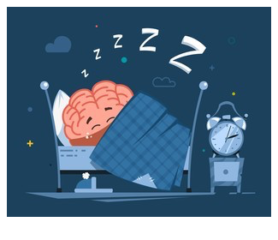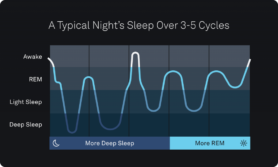Sleep
How dreaming keeps us sane: The story of nighttime emotional regulation
We all know what it’s like to have a bad sleep: the grumpiness, the fogginess, and the smallest things that feel ever so frustrating. It’s a truly human experience to roll out of bed in a zombie-like state, only to discover that you’re out of coffee. While there’s still no fool-proof solution to a caffeine disaster like this, we do have new research that can better explain why sleep can dramatically impact our mood — and how sleep helps make us, well, a little less grumpy.

Andrea Galbiati, an assistant professor of cognitive neuroscience, studies the effects of sleep disorders on brain function. The Milan-based researcher has been recently studying insomniacs, or people who struggle with falling asleep at night, and how stable their emotions are in comparison to regular sleepers.
As Galbiati has discovered, sleeping is crucial for bringing our emotions back into balance. When someone has a fitful night of sleep, critical restorative processes are interrupted, leading to a state of irritability the following day. But there’s good news in this, too. This relationship between sleep and our emotions could be the “missing link”, said Galbiati, allowing us to better understand the relationship between chronic poor sleep and mental health issues like depression.
And it’s hard to overstate the challenges facing those who struggle to sleep at night.
“It has been demonstrated that if you are an insomniac, you have a two-fold or three-fold risk to develop a major depression disorder,” said Galbiati.
At night, when your eyes close and you drift off to sleep, your brain doesn’t just shut down. It begins a very important cycle, switching back and forth between two main phases of sleep throughout the night — both of which are important for our health. Together, they help us store information we’ve learned throughout the day, process our emotions, restore energy, and reset so that we’re ready to start the next day with a clear mind.
But the part of sleep that seems to be most important for emotional processing seems to be the phase in which most dreaming happens. This critical dreaming phase occurs during REM sleep (Rapid Eye Movement). When in REM, most of our muscles are paralyzed and only our eyes move back-and-forth (hence the name). During this phase, our brains are nearly as active as when we’re awake.
“The EEG [Electroncephalograph] pattern of REM sleep is more similar to wakefulness than to non-REM sleep,” Galbiati said.

Additionally, the emotional centers of the brain light up during this period. Galbiati believes this activity could be a sign of emotional rebalancing. This process could be critical in helping us to better regulate our emotions during the day. For example, after an argument or conflict, it’s important to be able to calm yourself back down. That’s where REM sleep helps.
This also explains why sometimes it feels like you woke up on the wrong side of the bed. Most likely, you just didn’t sleep well. People who have interrupted REM sleep — shown by small muscle twitches or bursts of activity in the brain — are less confident in their ability to regulate their emotions and describe having more difficulty doing so.
Sarah Schoch, a sleep researcher in the Netherlands, agrees.
“REM sleep is more important [than non-REM sleep] for emotional processing and mental health,” said Schoch.
She also points out that we may also have REM sleep to thank for reducing the intensity of emotional or traumatic memories.
“REM sleep helps down-regulate the emotional association we have with a memory,” she said.
This could explain why embarrassing experiences usually don’t feel as bad the next day. Schoch calls this the “memory extinction process.” But, this process doesn’t work well when REM sleep is interrupted.
So, how can we reduce those interruptions?
Galbiati thinks that’s the million-dollar question. His better-sleep suggestions begin with what to strictly avoid. Number one, he says, is to avoid taking sleep aids like Valium or Xanax. These sleep aids and similar drugs suppress brain activity, potentially blocking the brain from transitioning between sleep stages, wreaking havoc on your sleep cycle.
Galbiati also suggests that if you’re struggling with emotional regulation, cognitive behavioral therapy (CBT) may help. For insomnia patients, CBT is currently the most effective therapy to allow them to get better sleep because it helps patients deal with the emotional challenges that keep them up at night.
With all this knowledge at hand, it can be tempting to focus on improving one particular part of your sleep. But, as Galbiati says, good sleep requires a holistic view.
“Each part of sleep is important for our well-being and a healthy life,” he said.
By Johanna Hostick on November 5, 2021
Sources:
Galbiati, Andrea et al. (2020) “The association between emotional dysregulation and REM sleep features in insomnia disorder.” Brain and Cognition, vol. 146, no. 105642. Elsevier, https://doi.org/10.1016/j.bandc.2020.10564.
Wassing, Rick, et al. (2019) “Restless REM sleep impedes overnight amygdala adaptation.” Current Biology 29, 2351-2358. Elsevier, https://doi.org/10.1016/j.cub.2019.06.034
Miller, Katherine E. and Gehrman, Phillip R. (2019) “REM Sleep: What is it good for?” Current Biology 29, R790-R807. https://doi.org/10.1016/j.cub.2019.06.074

